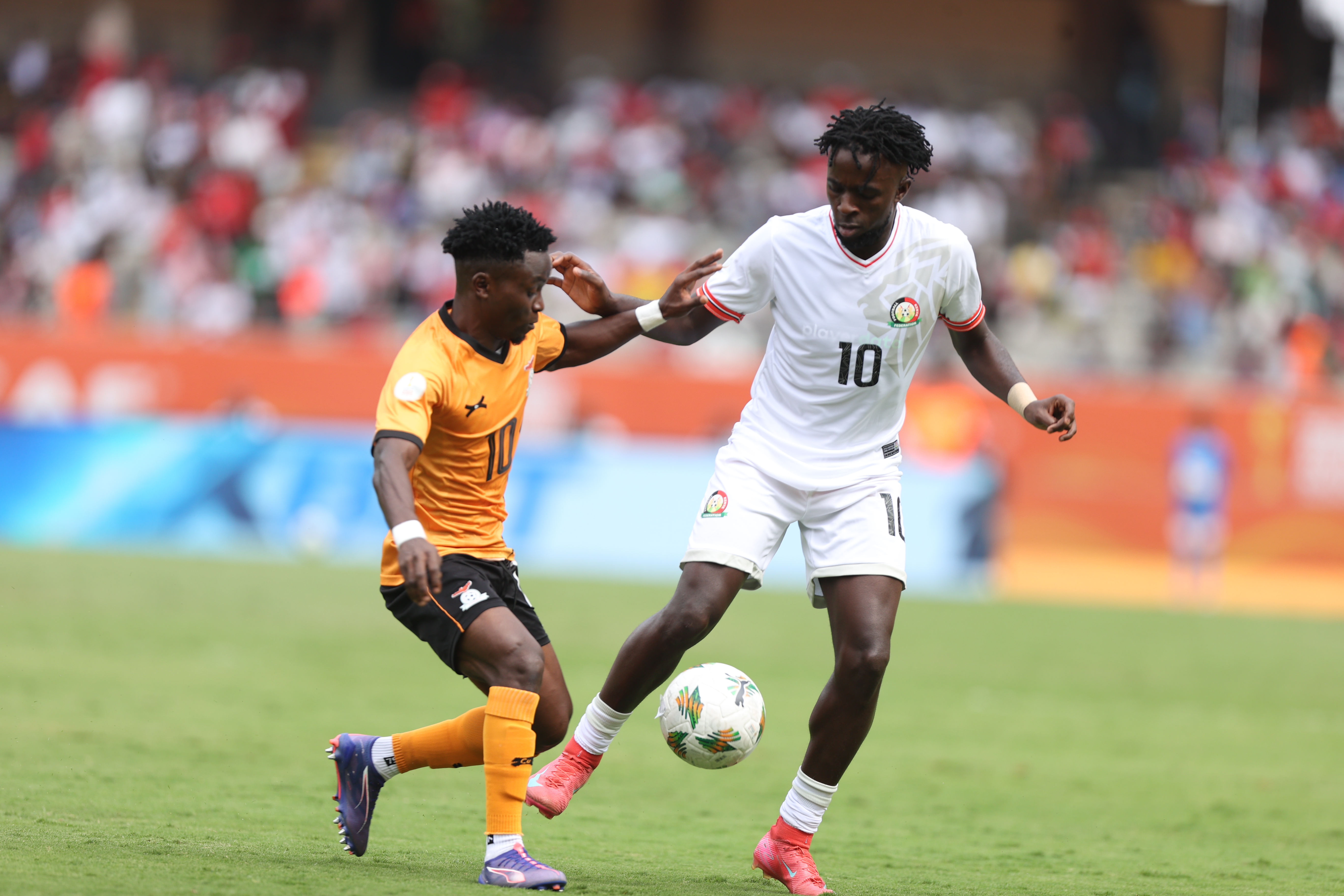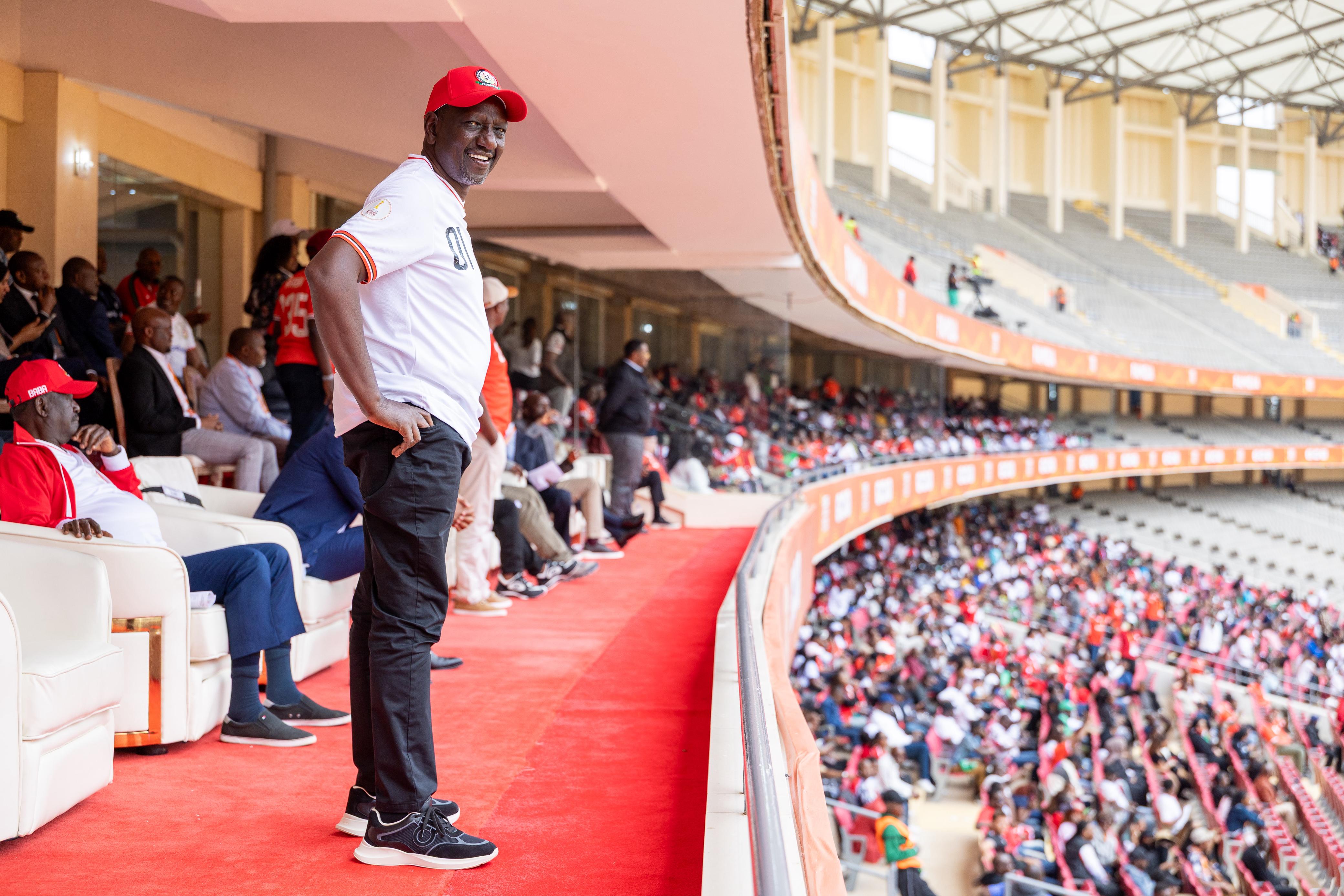
 Harambee Stars' Austin Odhiambo shields the ball from Zambia's Prince Mumba during a Chan 2024 Group A match at Moi Stadium, Kasarani/HANDOUT
Harambee Stars' Austin Odhiambo shields the ball from Zambia's Prince Mumba during a Chan 2024 Group A match at Moi Stadium, Kasarani/HANDOUTBaba Dogo is no longer under siege. The football ground that once teetered on the edge of oblivion, threatened by the greedy claws of private developers, has been restored to its rightful custodians — the community.
And at the heart of this redemption is Harambee Stars’ mercurial midfielder Austin Odhiambo, whose impassioned plea to President William Ruto transformed a looming tragedy into a hymn of triumph.
It was not in a courtroom that the ground was defended, nor in the dark chambers of bureaucracy where land titles exchanged hands like stolen trinkets.
No. It was on the sacred turf of Kasarani, moments after Kenya’s stirring 1-0 conquest of Zambia at the African Nations Championship (CHAN), that destiny shifted.
As drums thundered and flags danced, Austin chose not to bask in personal glory. Instead, he carried Baba Dogo in his heart and let his cry spill into the nation’s ears.
“Your Excellency,” he said, voice quivering like the strings of a guitar at dawn, “before anything else, Baba Dogo Ground — save it for us. Without grounds, there is no football. Without this dust, there are no dreams.”
The words hung heavy in the night air, slicing through celebration like a trumpet’s lament. President Ruto, still flushed with the thrill of victory, listened. And in that listening, a promise was born.
The dust that shapes destiny
For generations, Baba Dogo has been more than a football pitch. It is a cathedral of dust, where dreams are sculpted by barefoot boys, a sanctuary where the language of hope is spoken in nutmegs, sliding tackles, and makeshift goalposts.
This is where the rhythm of Nairobi’s industrial heartbeat meets the laughter of children. Where tomorrow’s stars learn that victory is forged in sweat, that teamwork is survival, and that football is not just a sport but a path out of invisibility.
When news spread that a private developer had trained bulldozers on this patch of earth, despair gripped the community. Mothers mourned before the first wall was raised. Fathers remembered their youth, stolen too soon, and feared their sons would be robbed of their inheritance.
A visit of assurance
On Tuesday afternoon, the dust of Baba Dogo rose again, not in fear but in jubilation. Football Kenya Federation (FKF) Vice President, McDonald Mariga, flanked by Austin and Harambee Stars striker Ryan Ogam, walked the sacred ground to reassure the community that their cries had not been in vain.
Mariga, once a maestro of the midfield and now steward of Kenyan football’s destiny, spoke with a voice both fatherly and fierce, each syllable a drumbeat of hope.
Austin stood before his people with tears shimmering like morning dew on cobblestones.
“I am one of you. This ground made me. If it dies, part of me dies. I thank the President for listening, but the real victory is here, in your smiles. Baba Dogo is home, and it will never be taken away again. Every kick, every laugh, every falling leaf on this pitch is a story of who we are — and it will live forever.”
Beside him, Ogam, the match-winning hero against Zambia, lifted his voice like a clarion call to unity.
“Football is not just about scoring goals. It is about lifting communities, stitching hearts together, turning dust into dreams. I am proud to stand here with Austin, with all of you, to say that this ground is safe. We will keep fighting for every child’s right to play, for every boy and girl whose laughter deserves to echo across Nairobi.”
Players forged in dust
Baba Dogo is more than soil and goalposts; it is a crucible where dreams are forged and futures take shape. Few embody this truth more than Austin Odhiambo, whose feet first learned rhythm on these very grounds.
Every nutmeg, every sliding tackle, every impromptu match under the afternoon sun sculpted the player he would become — not just a star of the Harambee Stars, but a voice for the community itself.
Alongside him, his brother Tyson Otieno sprinted across the same dust, his early triumphs on Baba Dogo pitches laying the foundation for his match-winning heroics on the national stage.
The winning goal against Zambia at CHAN was not merely a strike of skill; it was a distillation of countless hours chasing a ball on uneven soil, learning the subtle lessons of balance, timing, and courage that only grassroots football can teach.
Many others, like long-serving Harambee Stars captain Michael Olunga, Gor's Joshua Onyango, and many other prolific players, trace their origins to the spirited chaos of Baba Dogo tournaments.
Barefoot and resolute, these young hopefuls learned to read the game, to sense opportunities where others saw only dirt and stones.
The ground was their classroom, the ball their teacher, and every triumph and defeat etched a character forged in resilience. Even today, Baba Dogo continues to breathe life into Nairobi’s football dreams.
Children and teenagers gather before sunrise, chasing leather across the familiar dust, unaware that their modest games may one day echo in packed stadiums and national arenas.
In every sprint, in every goal celebrated with laughter and sweat, the legacy of the ground lives on — a reminder that football is born not in luxury, but in the untamed, spirited heart of communities like Baba Dogo.
 President William Ruto at Moi Stadium, Kasarani/HANDOUT
President William Ruto at Moi Stadium, Kasarani/HANDOUTA new dawn
As the sun set over Baba Dogo on Tuesday, the ground came alive once more. Children chased balls between makeshift posts.
Elders sat on stones, watching with eyes that had seen too many battles, and whispered blessings. The air was thick with the scent of redemption.
What had begun as a plea in Kasarani had become a movement — proof that football is not just a sport but a weapon of justice, a song of resistance, and a seedbed of unity.
Baba Dogo’s redemption is a beacon. It reminds Kenya that the war for community spaces is far from over. But it also proves that victories are possible when heroes rise — not just on the pitch but in the corridors of power and the heart of the people.
















